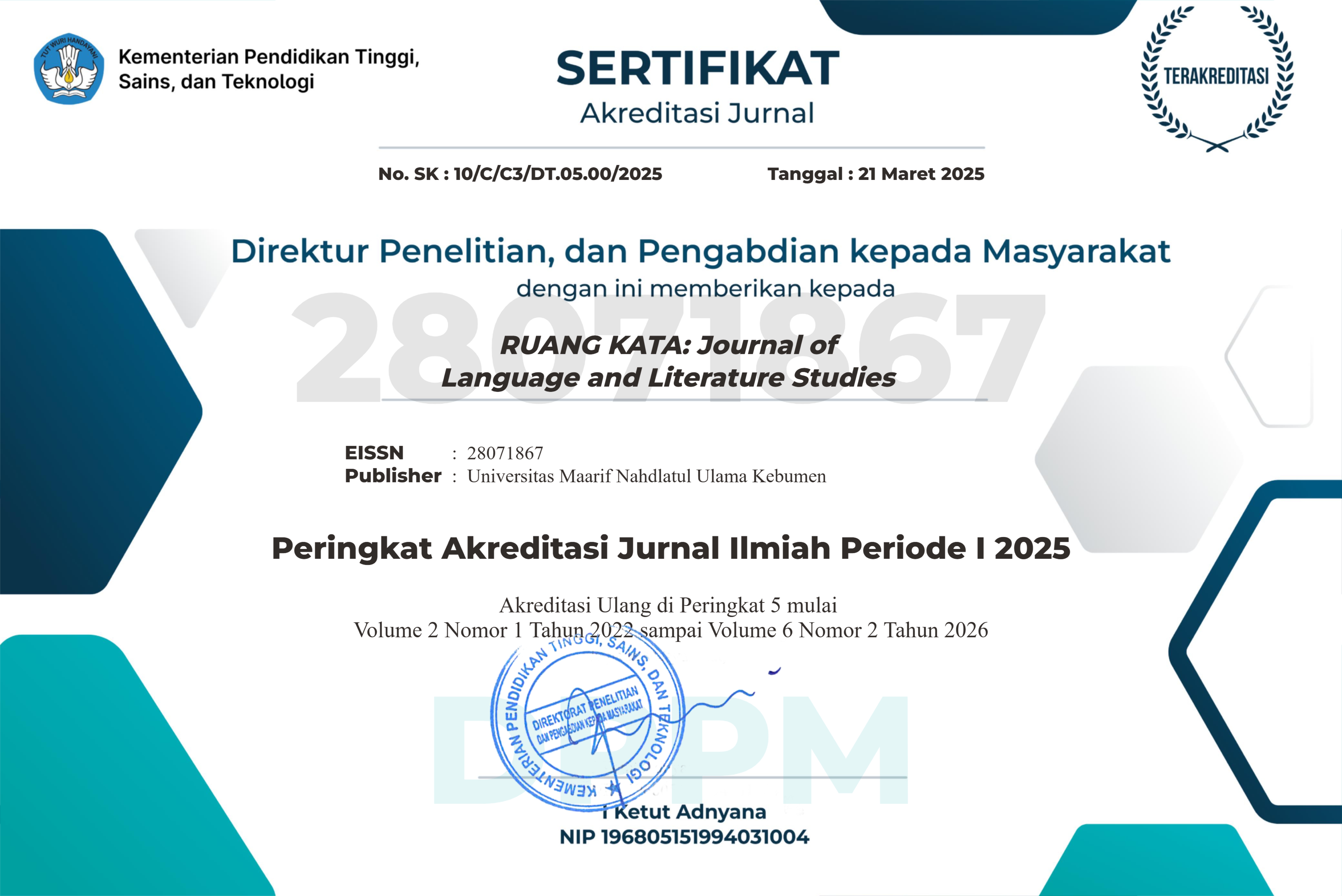Melacur Sebagai Eksistensi Tokoh ‘Saya’ dalam Cerpen “Istri yang Tidak Pulang” Karya Djenar Maesa Ayu
DOI:
https://doi.org/10.53863/jrk.v5i01.1591Keywords:
prostitution, subject, existensialism, feminism, BeauvoirAbstract
The short story “Istri yang Tidak Pulang” by Djenar Maesa Ayu, published in 2005, presents a narrative of resistance against the social constructs that restrict women’s autonomy, particularly in relation to the body, sexuality, and the institution of marriage. The protagonist, referred to as “Saya” (I), challenges dominant discourses that deem divorce and female sexuality as taboo. By leaving her husband and choosing to become a sex worker, she attempts to reclaim control over her body and subjectivity. This act is interpreted as a search for existential selfhood, in which the female character transforms from a passive object within a patriarchal structure into a conscious, autonomous subject who actively shapes her identity. This study employs a descriptive qualitative method through close textual reading and literature review. The analysis is grounded in Simone de Beauvoir’s existentialist framework, focusing on her concepts of the Other (L’Autre) and mauvaise foi (bad faith), to examine how the protagonist negotiates her identity and bodily agency within a patriarchal society. The findings reveal that the short story portrays a woman’s effort to assert her existence through her body, despite being haunted by internalized guilt and social stigma. The protagonist’s choice to engage in sex work is not viewed as a moral downfall, but rather as an act of resistance and existential liberation. It reflects an assertion of bodily autonomy and a rejection of the objectified role traditionally assigned to women. Consequently, the story provides a critical lens on societal norms and opens new space for reading Indonesian women’s literature as a site of struggle for identity, autonomy, and subjectivity in the face of deeply entrenched gender ideologies
References
Beauvoir, S. de. (2010). Second Sex.
Geleuk, M. B., Mulawarman, W. G., Hanum, I. S., Studi, P., Indonesia, S., Budaya, F. I., &
Mulawarman, U. (2017). PERJUANGAN TOKOH PEREMPUAN DALAM NOVEL TANAH
TABU KARYA ANINDITA S . THAYF : KAJIAN FEMINISME EKSISTENSIALIS. 1, 221–232.
Hanif Ivo Khusri Wardani, R. R. S. S. (2020). Citra Perempuan dalam Novel “Kala” Karya
Stefani Bella dan Syahid Muhammad. Alinea, 9 (2). https://doi.org/https://doi.org/10.35194/alinea.v9i2.1059
Harahap, N., & Jailani, M. (2024). Eksistensi perempuan dalam budaya patriarki pada
masyarakat muslim. 5(2), 80–88.
Kastanya, H. (2020). Jurnal Wanita dan Keluarga Eksistensi Perempuan pada Tokoh Kekayi
dalam Cerpen Kekayi dan Pohon Api Karya Oka Rusmini. 1(2), 26–34.
Maesa Ayu, D. (2016). Cerita Pendek Tentang Cerita Cinta Pendek.
Purnami, K. dan D. P. (2021). EKSISTENSI PEREMPUAN DALAM NOVEL KITAB
OMONG KOSONG KARYA SENO GUMIRA AJIDARMA : KAJIAN FEMINISME EKSISTENSIALIS SIMONE DE BEAUVOIR.
Septiaji, A., & Nuraeni, Y. (2020). The Struggle of Woman in Novel Merry Riana : Mimpi
Sejuta Dolar by Alberthiene Endah : Existensialist Feminism Studies. 4(3), 432–442.
Thornham, S. (2010). Teori feminis dan cultural studies. Jalasutra.
Tong, R. P. (2010). Feminist Thought. Jalasutra.
Udasmoro, W. (Ed). (2018). Dari Doing ke Undoing Gender: Teori Dan Praktik Dalam
Kajian Feminisme (W. Udasmoro (ed.)). UGM Press
Downloads
Published
How to Cite
Issue
Section
License
Copyright (c) 2025 Ardia Septi Wijianti, Ely Rusliawati

This work is licensed under a Creative Commons Attribution-ShareAlike 4.0 International License.
Authors retain copyright and grant the journal right of first publication with the work simultaneously licensed under a Creative Commons Attribution-ShareAlike 4.0 International License that allows others to share the work with an acknowledgment of the work’s authorship and initial publication in this journal














